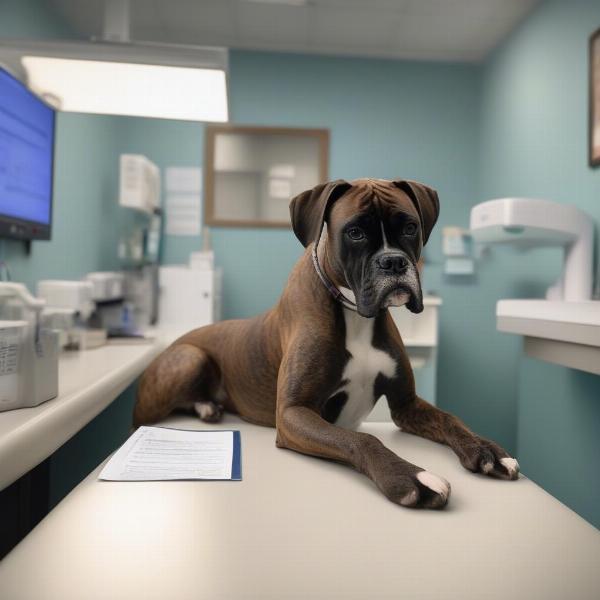The dark boxer dog, often referred to as a “sealed” or “reverse brindle” boxer, captures attention with its rich, dark coat. This striking coloration is a variation within the boxer breed, not a separate breed itself. This article delves into the genetics behind the dark boxer’s appearance, explores their temperament and care requirements, and provides valuable insights for anyone considering adding one of these beautiful dogs to their family.
While the standard boxer coat features a fawn or brindle base with white markings, the dark boxer showcases a deep, rich brindle that can appear almost black. This darker coloration is due to a higher concentration of black pigment in the brindle pattern. Genetically, it’s a fascinating display of how variations within a breed can result in such visually distinct appearances. Are dark boxers rare? Not particularly. The gene responsible for the darker coloration is recessive, meaning both parents must carry it for a dark boxer puppy to be born. While they may not be as common as the fawn or standard brindle, dark boxers are regularly found within boxer litters.
Temperament and Personality of Dark Boxer Dogs
Is there a difference in temperament between dark boxers and other boxers? The answer is generally no. Color doesn’t dictate personality in boxers. Like all boxers, dark boxers are known for their playful, energetic, and affectionate nature. They are intelligent, eager to please, and bond strongly with their families, making them excellent companions for both adults and children. However, their exuberant energy requires consistent training and socialization from an early age.
Caring for a Dark Boxer Dog
Caring for a dark boxer is much like caring for any other boxer. They thrive on regular exercise, a balanced diet, and consistent training. Grooming is relatively straightforward, requiring occasional brushing to maintain their short, smooth coat. Like all dogs, regular veterinary check-ups are crucial for maintaining their overall health and well-being. Here are some key aspects of dark boxer care:
Exercise and Mental Stimulation
Dark boxers are energetic dogs that need plenty of physical and mental stimulation to stay happy and healthy. Daily walks, runs, and playtime are essential. Engaging them in activities like agility training or puzzle toys can help keep their minds sharp and prevent boredom.
Diet and Nutrition
Feeding a high-quality dog food formulated for active breeds is crucial for maintaining a dark boxer’s muscle mass and energy levels. omega three for dogs Consulting with a veterinarian can help determine the appropriate portion sizes and dietary needs based on the individual dog’s age, activity level, and overall health.
Training and Socialization
Early training and socialization are vital for dark boxers. Their intelligence and eagerness to please make them quick learners, but consistency and positive reinforcement are key. Exposing them to a variety of people, places, and situations from a young age can help them develop into well-adjusted, confident adults.
Health Considerations for Dark Boxers
While generally healthy, dark boxers are predisposed to certain health conditions common to the breed, such as cardiomyopathy, hip dysplasia, and certain cancers. Regular veterinary check-ups and dog creatine kinase high monitoring can help detect and manage these conditions early.
 Dark Boxer Dog Receiving Veterinary Care
Dark Boxer Dog Receiving Veterinary Care
Finding a Dark Boxer Puppy
If you’re interested in adding a dark boxer to your family, reputable breeders are the best place to start. A responsible breeder will conduct health screenings on their breeding dogs and prioritize the well-being of their puppies. Be prepared to ask questions about the parents’ health, temperament, and lineage.
Conclusion
The dark boxer dog is a captivating variation within a beloved breed. Their striking appearance, combined with their playful and affectionate personalities, makes them wonderful companions for the right families. By understanding their specific needs and providing them with the proper care, training, and socialization, you can ensure a long and happy life with your dark boxer companion.
FAQ
- Are dark boxers more aggressive? No, coat color does not influence a boxer’s temperament.
- Do dark boxers require special grooming? No, their grooming needs are similar to other boxers.
- How much exercise does a dark boxer need? They need plenty of daily exercise, including walks, runs, and playtime.
- Are dark boxers good with children? Yes, they are generally good with children when properly socialized and trained.
- What health problems are dark boxers prone to? They are prone to the same health issues as other boxers, such as cardiomyopathy and hip dysplasia.
- How can I find a reputable dark boxer breeder? Research breeders carefully, ask questions about health testing, and visit the breeding facility.
- Are dark boxers rare? While not as common as fawn or standard brindle, they are not exceptionally rare.
Related Articles
About ILM Dog
ILM Dog (https://ilmdog.com) is your trusted international resource for all things dog-related. We offer expert advice and practical information on dog breeds, health, training, nutrition, grooming, and much more, catering to both new and experienced dog owners worldwide. From understanding specific breeds like the dark boxer to ensuring your dog’s overall well-being, ILM Dog is committed to providing reliable and up-to-date information. Contact us today for any inquiries: [email protected] or +44 20-3965-8624.